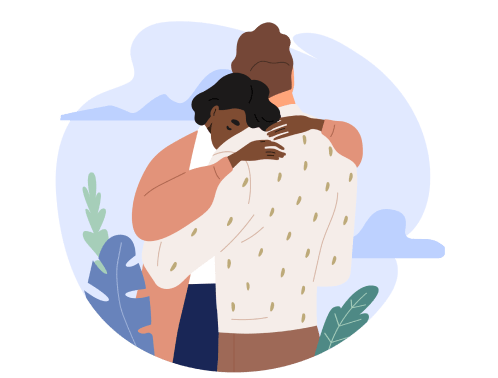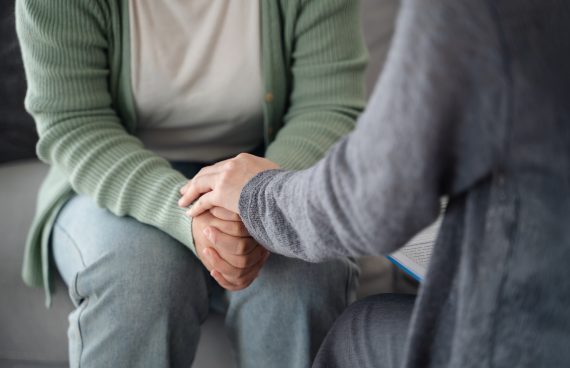Coping with grief: Supporting yourself and others

Grief is different for everyone
While the stages of grief (denial, anger, bargaining, depression, acceptance, or DABDA) are widely recognized, not everyone experiences them in the same order or intensity. Some may skip stages, experience them in a different order, or repeat stages. Today, grief experts note that DABDA is not a checklist but rather a guide to understanding emotions.
To many, the sheer strength of their grief can come as a surprise, and it may seem debilitating. This is a guide to help those living with grief and the new realities that come with it.
Self-care while grieving
Grief is often referred to as a journey. Unfortunately, the path is often overshadowed by a darkened sky or the tumultuous weather that comes with strong emotions.
To bear the cliffs and climbs of this journey, it can help to prepare with tools, communication, companions, and wellness essentials.
If one method doesn’t work, try another, and be sure to use multiple resources. Consider a mountain climber: A great climber may have the best tools, but they’ll be in even better shape when combining their tools with a climbing partner and good rest/a meal.
Try a few of the following ideas, and consider journaling to keep a record of what helps.
Tools – Support groups, specialized grief therapists, and online resources are just a few tools you can use to manage your grief. Here are a few examples:
Note: If your loved one was a hospice patient, Medicare’s hospice benefit includes counseling before and after death.
Communicate with yourself – In grief, it’s important to feel whatever you need to feel without judgement. If you sense any emotions that seem out of place, like anger, betrayal, relief, or guilt, give yourself permission to experience them. You may need to give yourself a few reminders: “It’s okay to feel these emotions.” “The emotion I’m feeling right now is resentment, and that’s okay. I acknowledge it, and I will let myself feel it, but I will not let it take over.” Remind yourself that it’s okay to feel whatever emotions may come, even if they seem irrational or unwelcome.
Companions – It’s also important to inform others of your needs. Let your friends and family know if you require a moment to yourself, emotional or practical support, or to talk about what’s on your mind. If you want to speak with someone, tell them what you need and don’t need in that moment; that can be advice, a shoulder to cry on, or a patient listener. And remember, everyone’s grief is different. So, even if your friend/family has experienced grief, they may not know or understand exactly how you’re feeling unless you tell them.
Wellness essentials – Even a simple journey can be exhausting if your body is unprepared. Caring for yourself while grieving can be difficult, but it’s vital to protect your physical health. Monitor your wellness habits, and try to sleep, exercise, eat healthy meals, and manage your stress levels. If you don’t have the energy to exercise, start with short walks (10-15 minutes) or indoor/outdoor chores to slowly create a routine. If you notice a serious decline in your health, contact your doctor as soon as possible.
Grief advocate and author Megan Devine likes to say, “It’s okay that you’re not okay.” As you experience grief, know that this journey is not about reaching the end.
Your grief may last as long as your love for the departed, but it can change in form and severity. You may have flare-ups, relapses, or days when it seems like your grief has dissipated. And one day, the journey may be easier to handle.
Grief management only comes with diligent self-care; it can be incredibly difficult, but with the right support, there is a way to traverse the peaks and valleys of grief.
Supporting a grieving family member or friend
Grief is part of the human experience, but thankfully, so are compassion and love. And when a loved one is in need of support during a difficult time, our desire to help kicks in. But where do you start? Here are a few options:
- Start by simply being there. Your presence alone can be comforting, even in silence. Don’t try to fix the situation or serve as a mental health professional. Just be there, ready to listen if your loved one wants to talk.
- If you tell the bereaved you’ll be available to help after the funeral, be sure to keep your word. You can offer practical help, such as running errands, buying groceries, prepping meals, helping with dependents/pets, or handling household chores. These everyday tasks can be overwhelming for someone in grief, and your assistance can lighten their load.
- If you’re unable to support them in-person, try to check in regularly with calls, texts, letters, or a care package. Ongoing emotional support and socialization can make a world of difference.
When someone suffers a loss or tragic circumstance, try to understand how grief will affect them and consider offering support that will be helpful to their specific situation.
As you support your loved one, remember that if they do need a moment to be alone, be sure to respect their space. Let them process their emotions in their own time, and don’t pressure them to talk about the loss if they’re not ready. Never rush them through their grief or assume they should feel better after a certain time.
Crisis support
If you or someone you know is in a mental health crisis, call 988, 911, or go to an emergency room as soon as possible. Helping a loved one may involve finding mental health resources and encouraging them to seek professional support when needed. Remind them that you care for them and help is available.
Sources
Hospice Coverage






 Use current location
Use current location









